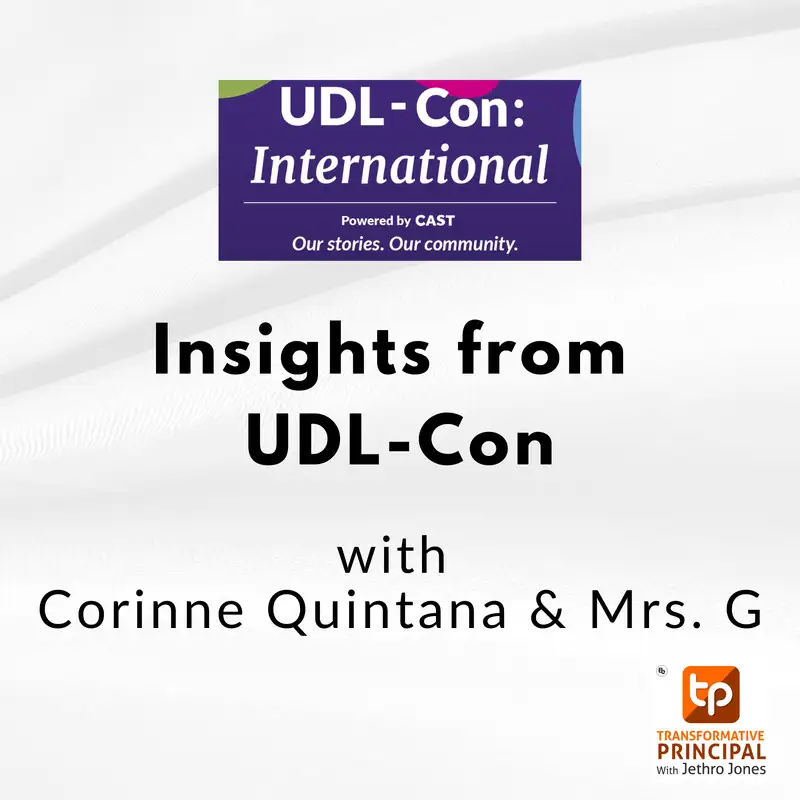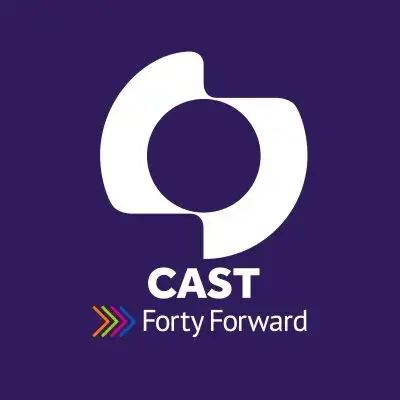Insights from UDL-Con with Corinne Quintana & Mrs. G #udlcon
Download MP3Corrine and Mrs. G.
===
[00:00:00] All
Welcome to Transformative Principal. We have another, uh, brief interview today. I have
Corinne Quintana and Mrs. G. Uh, and first tell us where you're at and what your roles are.
Uh, we are both from the Eastern Sierra,
and this is Ms. G
in Bishop California.
And I am the high school math department chair,
and I am assistant principal of the high school.
Okay, welcome. So you're here at UDL Khan. What, uh, what made you want to come to this? Why are you here at this conference?
So, I've had some training in UDL as a teacher and I felt [00:01:00] like I. It was really big and ambiguous, like what is UDL?
It could be so many things. Um, and so I felt like as a leader, I didn't know how to really break it down for staff that are new to UDL, like how am I going to help them develop these skills and integrate it into their classrooms, um, when I find it so overwhelming. And so coming to this conference, I was really hoping to be able to.
Just kind of have a simplified toolkit that I can at least share with them to introduce it and we can build off of that.
Okay, Ms. G.
Uh, so I, as the math department chair, I come from a, a department that is pretty well seasoned. I have the least amount of experience at 15 years in my department. So, um, our department in some ways is, is really well-oiled machine, but it also means that like.
Um, we're a [00:02:00] little resistant to new ideas and my department is going through UDL training during our PLC time in the fall, and so I wanted to just like, not just be going through it when my department goes through it, but like be able to actually lead them if I have some pre-training. Okay.
Okay.
Yeah. We'll be
leading them together.
So we're, we're both trying to,
there you go.
Yeah. Okay.
Get some, uh. Some UDL muscle
going, there you go.
there you go.
Exactly. Okay. We're both, we both like have weightless lifting like hobbies as in our past, so
we can use
as an analogy. Yeah. Yes. Okay. Very.
So,
Okay, so, uh, first, first day, first half of the day, really, what are your takeaways from the first half of the day today so far?
Can I cheat and look at my
You sure can.
Um.
I will interrupt. We'll, Dimitri Yeah, go ahead. Um, so I really enjoyed, we went to a math session this morning, right? Yeah. Trying to figure out how we're [00:03:00] gonna sell this to the math department. Yeah. And, um, just this idea of, and this goes back to UDL being so comprehensive, um, that UDL would also be. Doing SEL work in the math classroom.
Um, so that was a huge takeaway and I think that that is a great way to introduce UDL to the math department because think all math teachers can agree that kids definitely
feel
resistance to doing math. They definitely question their math abilities, their skills, and so that is something that we can all agree on and start there
and cool.
Yeah.
Um, so I, I mean, I went to that same session, um, and, um.
What do I wanna say about that? Um,
you had a lot to say about that. I did have a lot to say about, oh gosh. Remind me of what I had to say about it. I had to leave her there. I was like, she, she couldn't stop
Yeah,
Yeah, I mean, I think the biggest thing is, [00:04:00] um, the things that we're doing right already really are our UDL right? Uhhuh. And I think that, like for me, UDL is. Is a perspective, um, in that I think a lot of times when kids are unsuccessful in math, there's a tendency to like blame the learner. And instead of taking a reflective approach and saying, okay, what can I control and what am I doing that is, is. Limiting, uh, to their accessibility to the content, but also like, just like listening to students in their learning styles. 'cause they can actually teach you a lot about how they learn and what they need. Yeah. Because they actually, they, they have lots of hacks That they're implementing already to like find their ways.
Yes. So like, be successful.
Yep. So, so that's what I love about this approach is that it, It honors the things they're already doing, and if they're not doing something, it gives us a [00:05:00] mandate to help them figure out how to hack the situation so they can be most successful. That's one of the things that I just love about UDL and you said it really beautifully right there. I think that's incredibly powerful for our students.
So as a stepparent, my children, because they're not biologically related to me, like have characteristics and traits that are not like me and they don't learn like me, they're, they're both, um, like artistic and one is an actress and one is a musician.
And just like I actually had them as students in my classroom. And so learning how they learn math. Was because I was very motivated. 'cause they're my own children. Yeah, yeah. To like figure out how to teach math to them. But it really, it just really broadened my perspective and like always having that, that idea of like, how would Allison learn this?
What would be the best way for, to get this across to her? Yeah. So,
yeah, powerful. Good. Any final words? You look like you're about to say something.
Yeah, I just think it also tied in with [00:06:00] our, our keynote speaker this morning, just that by looking at students who learn differently, we can improve learning for all students.
And that's really what that comes down to. And it, it, one of the fellow math teachers in our group mentioned that also, just that seeing how. The unique and creative ways that some students solve problems, that you can apply that to other students that are not succeeding with your traditional instruction methods.
So really just, uh, you know, UDL can also be us learning from students and then that growing our, teaching practice and making us more successful as educators.
Thank you. Well, Corin and Ms. G, thank you so much for your time and for being here at UDL com. This is awesome.
Alright, thank you so much.
Thank you.
Creators and Guests



